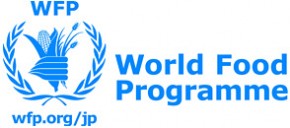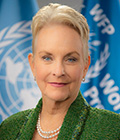World Food Programme (WFP) Japan Relations Office

What is WFP ?

Cindy McCain
The World Food Programme (WFP) is the leading humanitarian organization fighting hunger worldwide. In emergencies, WFP is often first on the scene, providing food assistance to the victims of war, civil conflict, drought, floods, earthquakes, hurricanes, crop failures and natural disasters. When the emergency subsides, WFP helps communities rebuild shattered lives and livelihoods and also works to strengthen the resilience of people and communities to future shocks by applying a development lens in our humanitarian response.
WFP is part of the United Nations system and is entirely voluntarily funded.
Established in 1961, its vision is also guided by the Sustainable Development Goals (SDGs), in particular SDG 2 on ending hunger and SDG 17 on revitalizing global partnerships for implementation of the SDGs. WFP works towards that vision in partnership with its two sister UN agencies in Rome ― the Food and Agriculture Organization (FAO) and the International Fund for Agricultural Development (IFAD) ― as well as with other government, UN, NGO, and private sector partners.
WFP has a presence in over 120 countries and territories, and it assisted about 160 million people in 2022. Over 23,000 staff members work worldwide for the organisation, of whom almost 90 percent are based in the countries where the agency provides assistance.
In 2020, WFP was awarded the Nobel Peace Prize for “its efforts to fight against hunger, for its contribution to bettering conditions for peace in conflict-affected areas and for acting as a driving force in efforts to prevent the use of hunger as a weapon of war and conflict”.
Message from WFP Japan Relations Office

Yasuhiro Tsumura
The scale of the current global food and nutrition crises is unprecedented. Up to 783 million people worldwide suffer from hunger. Hunger is still on the rise in Western Asia, the Caribbean, and across all regions in Africa.
In 2023, WFP estimates that in 79 of the countries we operate (and where data is available), 345 million people face acute food insecurity. This number is more than double the number in early 2020. More than 40 million people in 51 countries are at ‘emergency’ or worse levels of hunger, a stage where people are facing extreme food shortages and the risk of hunger-related deaths is rapidly increasing.
For the past 2 years, the socio-economic impact of the COVID-19 pandemic and the war in Ukraine exacerbated global hunger by pushing millions of vulnerable people into greater food insecurity and pushing up the cost of delivering assistance. Both events caused a major setback in the fight to achieve the Sustainable Development Goal target of Zero Hunger by 2030.
Whilst the combination of conflict, economic shocks, the climate crisis and high fertilizer prices create unprecedented food crises. Conflicts remain to be the main cause of hunger in most food crises around the world. All four countries which are considered to be at risk of famine in 2023 are at high levels of armed conflict. The crisis in Ukraine has shown how conflict can cause hunger, displace people and deprive sources of income. The climate crisis is also one of the major factors behind the surge in global hunger. Climate shocks like floods, drought or heatwaves take lives, destroy crops and livelihoods, and make it difficult for people to secure food.
With the soaring prices of food, fertilizer, and energy, WFP’s operation expenses are also at a record high. WFP’s monthly operational cost has gone up by 44% from the 2019 average. WFP is faced with crippling funding challenges and being forced to scale back life-saving assistance. Roughly a half of WFP country operations have already cut or plan to soon cut the size and scope of food, cash and nutrition assistance programmes. Providing less food to more people only has one result – more hunger.
Now we are less than a decade to the deadline to achieve the Sustainable Development Goals; WFP is working with governments, partners, communities and households, to break the cycle of hunger and malnutrition and, to build resilience to shocks as well as prosperous and sustainable future.
Japan is one of the world’s leading donors to WFP, and WFP receives contribution from both the public sector – the Government of Japan and the private sector including companies, organisations and individuals. WFP will continue to work together with the people of Japan through various activities to achieve a world without hunger.
Contact
World Food Programme (WFP) Japan Relations Office
Pacifico Yokohama 6F, 1-1-1, Minatomirai, Nishi-ku, Yokohama-shi, Kanagawa, 220-0012, Japan
http://www1.wfp.org/ (English)
http://ja.wfp.org/ (Japanese)
@WFP.JP (Facebook)
@WFP_JP (Twitter)


